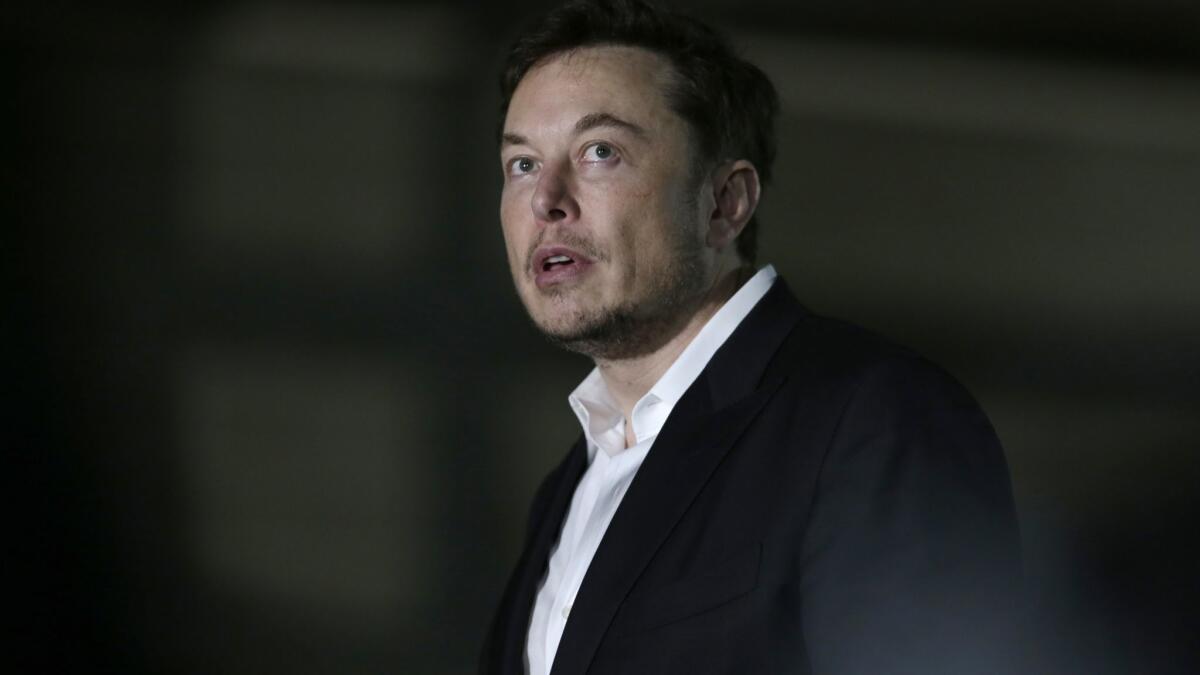Elon Musk’s Tesla tweets are no longer scaring short sellers

If Elon Musk’s goal was to bury the Tesla short sellers, it hasn’t quite worked out.
As fast as Tesla shares surged after Musk tweeted about taking the company private, they’ve come back down. Mounting skepticism and an inquiry by the Securities and Exchange Commission have erased most of an 11% gain.
“It always ends poorly for companies when they’re trying to squeeze the shorts,” said Chris Brown, managing member at Aristides Capital, whose biggest position is a Tesla short. “The idea of a transaction itself is idiotic.”
As always, audacity is proving a double-edged sword for Musk, the Tesla chairman and chief executive whose eight-year battle with public naysayers was a reason he gave for weighing the deal. After going public on Twitter without providing any financing specifics and igniting a frenzy of attention, the 47-year-old billionaire’s gambit has seen its market impact fade.
“I doubled my short position the morning after Musk’s original tweet,” Robert Chapman, money manager at Chapman Capital, said in an email. “The more one learns about this situation, the more this appears to be a fakeover vs. takeover.”
Of course, Tesla’s stock is often portrayed as a pitched battle between fervid bears and a megalomaniacal iconoclast. But in reality, Musk has usually won. Shares of the electric-car maker have posted a 47% annualized gain since going public in 2010. And despite trading at more than 200 times next year’s earnings, the stock is up about 13% this year.
Anchored by a famously loyal shareholder base, the shares suffered only brief setbacks this year when Musk called a British cave diver in the Thai rescue mission a pedophile and portrayed a former battery factory employee as a saboteur. Although he was urged last month by shareholder Baillie Gifford & Co. and bullish venture capital firm Loup Ventures to focus on execution, there’s been no signs of a mass institutional defection.
Tesla shares traded at $353.20 around 10 a.m. Pacific time on Friday. It was lifted overnight by a CNBC report that Musk previously talked with Saudi Arabia’s wealth fund about a take-private deal and that its board plans to meet with financial advisors next week. The stock was trading around $357 at the time of Musk’s Tuesday tweet.
“If somehow Elon Musk pulls the final rabbit out of the hat and gets the funding for this buyout, that’s $67 upside from its close,” said Brian Frank, portfolio manager at Key Biscayne, Fla.-based Frank Capital Partners LLC who was short the stock in the first quarter. “I’m personally skeptical.”
On Tuesday, those betting the stock would fall absorbed a blow that by some measures cost them more than $1 billion, but the short sellers’ resolve against Tesla — sometimes hatred — is proving hard to crack. Overall, accounting for positions that were covered, the loss shrank to about $304 million as of Thursday, according to Ihor Dusaniwsky, head of research at S3 Partners, a financial technology and analytics firm.
“We’ve seen some of the larger shorts increasing their positions a bit,” Dusaniwsky said in an email. “In relative terms to the gains and losses Tesla shorts have incurred over the last several years, this is just a drop in the bucket and not enough to force large margin calls to well-capitalized large short players, and definitely not enough to scare any of them out of their positions.”
On Thursday, Bloomberg News reported that SEC investigators are intensifying scrutiny of Tesla’s public statements in the wake of Musk’s tweet saying he had “funding secured” for a transaction at $420. Enforcement attorneys were already gathering general information about Tesla’s public pronouncements on manufacturing goals and sales targets, according to the people, who asked not to be named because the review is private.
Musk referred to his company as the “most shorted stock in the history of the stock market” in a Tuesday letter laying out reasons for going private. Hedge fund managers such as Jim Chanos and David Einhorn have been vocal public critics, and Tesla’s every utterance is parsed on Twitter by a phalanx of skeptics.
Musk’s tweets did not send options traders into a buying frenzy — more the opposite. Despite publication of a buyout target more than 10% above prevailing market prices, bearish contracts have seen greater demand in the aftermath. Implied volatility for puts betting on a 10% decline in the stock over the next three months, a measure of options cost, is 13.6 points wider than comparable calls, the widest gap on record, data compiled by Bloomberg showed.
Hedge fund manager Joe Spiegel of Dalek Capital said he sold calls expiring next week, a position that amounts to a bearish bet on the stock.
“My rough calculation was that if this deal is real — which I doubt — the chance of a topping bid above $420 happening in the next 10 days was extremely low,” Spiegel said. “Even if the deal if real, it is so preliminary that the stock shouldn’t really trade more than $367.50 or so.”






